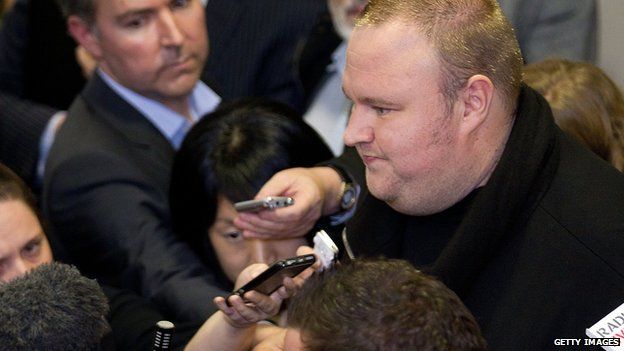Kim Dotcom launches New Zealand political party
- Published

Kim Dotcom, whose site MegaUpload was shut down by US authorities in 2012, has formally launched a political party in New Zealand.
The Internet Party was a "movement for the freedom of the internet and technology, for privacy and political reform", the tycoon said.
New Zealand goes to the polls in September.
Mr Dotcom is fighting extradition to the US over charges of copyright infringement on a "massive scale".
Digital currency
To enter parliament, the Internet Party must win an electoral seat or secure 5% of the vote. One suggestion was that he could align with an existing party, but his most likely ally earlier this week cast doubt on that plan.
On its website, the party said that it would "give you faster, cheaper internet, create high-tech jobs, protect your privacy and safeguard our independence".
It also promised to introduce "a New Zealand-sponsored digital currency that is safe, secure and encrypted".
Mr Dotcom was arrested at his mansion near Auckland, New Zealand, in January 2012. As well as MegaUpload being shut down, Mr Dotcom's assets were frozen.
But later scrutiny of the raid led to New Zealand Prime Minister John Key apologising to Mr Dotcom for what were described as "basic errors" by intelligence services in collecting information on behalf of the US.
US authorities accuse him of earning more than $175m (£106m) by facilitating the distribution of pirated copies of movies, TV shows and other content. Kim Dotcom denies any wrongdoing.
In January 2013, a year after the closure of MegaUpload, he set up Mega, which also allows users to host and share large files on the internet.
Earlier this week, he announced plans to list his new file-sharing firm on the New Zealand stock market.
He also caused controversy this week by admitting he owned a signed copy of Adolf Hitler's book Mein Kampf.
But the internet entrepreneur said he was "totally against" the Nazis and pointed out he also owned objects that had belonged to Churchill and Stalin.
- Published25 March 2014
- Published19 February 2014
- Published21 August 2013
- Published20 June 2013
- Published31 May 2013